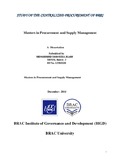Study of the centralized procurement of BRRI
Abstract
The procurement system of the Re-public of Bangladesh is a combination of centralized and decentralized systems. Centralized procurement can enhance the achievement of the following: (i) cost reduction through economies of scale; (ii) product and service standardization; (iii) quality optimization of products and services procured; (iv) knowledge sharing among specialists, resulting in better use of human resources. It also shows that centralized procurement tends to benefit small public bodies, allowing them to acquire better products at a lower cost and to allocate their limited human and financial resources in sectors more directly related to their core competencies. Public procurement is a major function of government in both developed and developing countries. Transparency, efficiency, accountability, competitiveness, equitable treatment and free & fair competition are essential to be ensured in the procurement using public funds. In Bangladesh, these could not be ensured earlier due to a lack of proper rules and regulation. To streamline the public procurement activities, the Government of the Peoples Republic of Bangladesh has enacted Public Procurement Act (PPA) 2006 and thereafter issued Public Procurement Rules (PPR) 2008. Since then government agencies are bound to abide by the Act and Rules very strictly in their procurement activities. BRRI is an autonomous organization. The research has been designed under the questions if BRRI is following PPR 2008. A questionnaire survey was carried out to collect primary data from different employs related to procurement activities of BRRI and contractors. The study result shows Centralized procurement can enhance the cost reduction, product and service standardization, product and service standardization quality and optimization.

